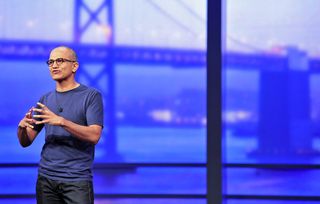Microsoft CEO Nadella comments on U.S. Executive Order ban on Immigration and offers legal advice

Yesterday, the Trump administration signed a new controversial Executive Order that temporarily bans citizens from Iran, Iraq, Libya, Somalia, Sudan, Syria and Yemen from entering and being readmitted into the United States. The Order also put a four-month hold on allowing in refugees fleeing war-torn regions like Syria and includes women, children, and even those who fought alongside the U.S. military in Iraq.
The Order is also about businesses and employees as Microsoft's president and chief legal officer, Brad Smith has confirmed that 76 of its own are affected by the new ban. Microsoft is in contact with those employees but noted that workers with U.S. green cards (legally permanent residents) and some family members may not have all the information they need quite yet.
Smith goes on to define Microsoft's role as providing "...you with legal advice and assistance."
Adding more information, Smith discusses the politically volatile decision by the Trump administration and Microsoft's view:
As we have in other instances and in other countries, we're committed as a company to working with all of our employees and their families. We'll make sure that we do everything we can to provide fast and effective legal advice and assistance.More broadly, we appreciate that immigration issues are important to a great many people across Microsoft at a principled and even personal level, regardless of whether they personally are immigrants. Satya has spoken of this importance on many occasions, not just to Microsoft but to himself personally. He has done so publicly as well as in the private meetings that he and I have attended with government leaders.As a company, Microsoft believes in a strong and balanced high-skilled immigration system. We also believe in broader immigration opportunities, like the protections for talented and law-abiding young people under the Deferred Access for Childhood Arrivals (DACA) Program, often called "Dreamers." We believe that immigration laws can and should protect the public without sacrificing people's freedom of expression or religion. And we believe in the importance of protecting legitimate and law-abiding refugees whose very lives may be at stake in immigration proceedings.We believe that these types of immigration policies are good for people, good for business, and good for innovation. That's why we've long worked to stand up for and raise these issues with people in governments. We will continue to do that.
Posting on LinkedIn, Microsoft CEO Satya Nadella published the entire letter that was sent to all Microsoft employees. Nadella, as expected, shared an even-handed and a personal note about the Order:
As an immigrant and as a CEO, I've both experienced and seen the positive impact that immigration has on our company, for the country, and for the world. We will continue to advocate on this important topic.
Google too has expressed concerns over the new Order. CEO Sundar Pichai sent an email to its employees noting that about 100 of them were affected by the new ban and that "We'll continue to make our views on these issues known to leaders in Washington and elsewhere."
At the time of this article the Order has been in effect for less than 24 hours, but already issues with travelers, refugees, and permanent residents being turned away at US airports or from boarding flights were being reported. Likewise, protests at JFK and other major airports against the new Order were taking place.
Get the Windows Central Newsletter
All the latest news, reviews, and guides for Windows and Xbox diehards.

Daniel Rubino is the Editor-in-chief of Windows Central. He is also the head reviewer, podcast co-host, and analyst. He has been covering Microsoft since 2007, when this site was called WMExperts (and later Windows Phone Central). His interests include Windows, laptops, next-gen computing, and watches. He has been reviewing laptops since 2015 and is particularly fond of 2-in-1 convertibles, ARM processors, new form factors, and thin-and-light PCs. Before all this tech stuff, he worked on a Ph.D. in linguistics, watched people sleep (for medical purposes!), and ran the projectors at movie theaters because it was fun.
